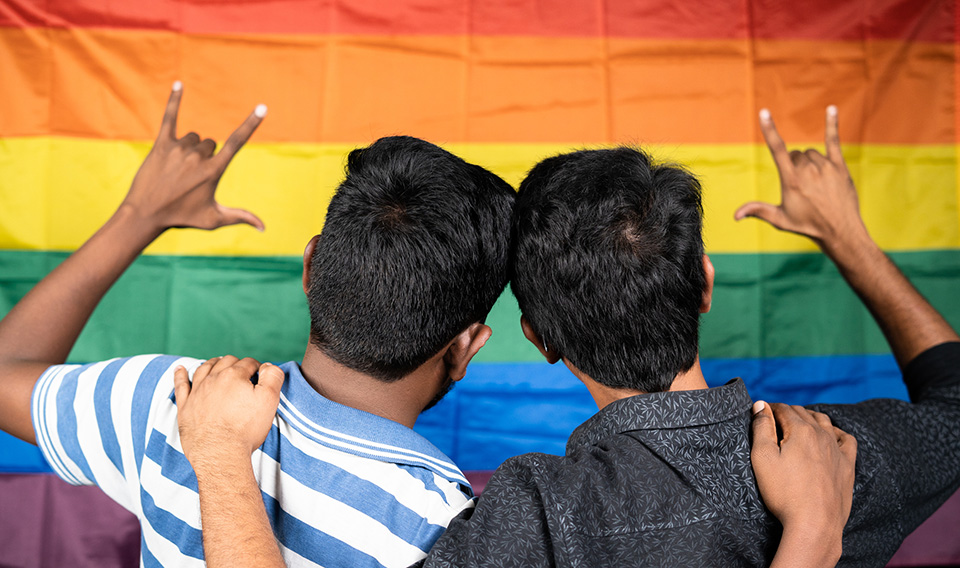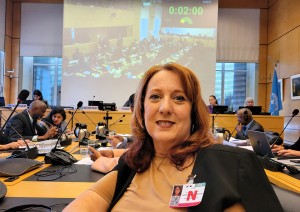CSUN Lecturer to Spend Summer on Fulbright Project to Develop Programs to Support Queer People in India

CSUN criminology and justice studies lecturer Denice Labertew has been named a Fulbright Specialist. She will spend this coming summer working with faculty, students and the surrounding communities at National Law University Odisha, India to help them develop plans that support the queer community in that country. Photo credit Photo credit, lakshmiprasad S, iStock.
Denice Labertew will spend this coming summer working with faculty, students and the surrounding communities at National Law University Odisha, India to help them develop plans that support the queer community in that country.
Labertew, a criminology and justice studies lecturer at California State University, Northridge, has been named a Fulbright Specialist by the U.S. Department of State and invited to take part in a project, “Capacity Building in Law and Queerness Teaching and Research,” at National Law University Odisha in eastern India. The work includes capacity development of legal efforts to support “liberty and justice for queer people in India,” she said.
“It’s really exciting, given all the changes that are taking place in India right now,” said Labertew, who teaches in CSUN’s College of Social and Behavioral Sciences. “Truth be told, they are progressing when it comes to issues surrounding queerness and gender in ways that are no longer happening here in the U.S. In fact, we’re sort of shifting backwards. I was a little surprised that they wanted an American expert to work with them, and I am honored that I get to take part in this project.

Denice Labertew at a meeting at the United Nations. Photo courtesy of Denice Labertew.
“In meeting with the teams from the National Law University Odisha, we were talking about expanding how we think about gender within the context of queerness,” she said. “They also are really interested in ways to incorporate a gendered lens beyond criminal law — applying a gendered lens to the other courses like housing laws, civil rights, corporate law, environmental law. So often, we forget about the impacts all of these aspects of people’s experiences have when it comes to gender.”
In addition to working with the faculty and students to develop curriculum that includes addressing legal issues and the queer community, Labertew has been invited to co-teach a course with the school’s vice chancellor, one of India’s leading experts on gender, and to teach a short course on gender and queerness in the law.
“One of the most exciting pieces is that the school facilitates village legal clinics, which do a lot of legal education in the villages and communities throughout the region (country),” she said. “They’ve invited me to go with them to some of the village legal clinics and support the work there.”
This summer will not be Labertew’s first visit to India. In 2013, following the violent sexual assault and death of a female medical student, Labertew — a CSUN alumna who trained as an attorney and has spent nearly 30 years working, including with the United Nations, as an advocate for women’s and gender rights — was invited by the U.S. Department of State to work with Indian officials to help them develop capacity around gender-based violence.
“Efforts like these are an opportunity to share my years of experience as an advocate on gender issues, but I also get something in return,” she said. “One of the great things for me about going to India in the past and a lot of the international work that I have done, is that, even though I am seen as an expert in my fields, I learn so much about people and people’s lived experiences. This project presents another opportunity to learn.
“Every semester I start my classes by talking about theory because it’s an important foundation,” Labertew said. “Then I start talking about people’s lives. One of the things I tell my students is that people are messy, and they should never forget that theory and real life can often seem to contradict each other, but we need to respect and understand real lived experiences.
“So much, at least in this country — in other countries like India not so much — so much is seen through a binary frame,” she continued. “But that binary frame loses important aspects of people’s real experiences because, even if you aren’t queer, not everyone woman conforms to a very rigid idea of femininity, nor every man conforms to the rigid idea of masculinity.”
Labertew said what drew her to the Fulbright Specialist Program was its emphasis on exchange.
“Exchange is critical,” she said. “When we are faced with the narratives of other people’s reality, then we can contextualize our own experiences and understand concepts better. It removes boundaries and invites conversation.”
The Fulbright Specialist Program, part of the larger Fulbright Program, was established in 2001 by the U.S. Department of State’s Bureau of Educational and Cultural Affairs. The program pairs highly qualified U.S. academics and professionals with host institutions abroad to share their expertise, strengthen institutional linkages, hone their skills, gain international experience and learn about other cultures, while building capacity at their overseas host institutions.
Specialists are competitively selected to join the Fulbright Specialist Roster based on their knowledge, skill sets and ability to make a significant contribution to projects overseas. Those individuals approved to join the roster are then eligible to be matched with approved projects designed by foreign host institutions from more than 150 countries and other areas. Once abroad, the specialists partner with their host institution to conduct project activities in support of the host institution’s priorities and goals.

 experience
experience